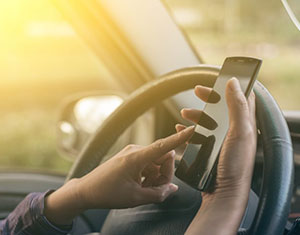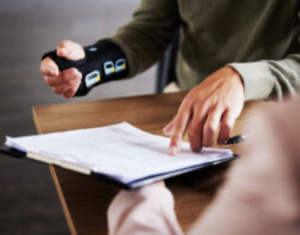Trust Atlanta’s Premier Legal Team for Self-Driving Car Accidents
Table of Contents
One of the biggest technological innovations of the 21st century is the autonomous vehicle, more commonly known as the self-driving car. While these are intended to make the road safer, they have been involved in hundreds of crashes in less than a year. As exciting as it may be to participate in this new technology, it presents new risks for both the driver and the vehicle itself. These factors, combined with the novelty of the law, require a knowledgeable and experienced attorney to guide your case to a successful outcome.
What is a Self-Driving Car Accident?
A self-driving car accident refers to a car accident involving autonomous vehicles.
Georgia was one of the first states to legalize Self-Driving cars in 2017. As part of the legalization efforts, it is required that drivers of autonomous vehicles have 2.5x the minimum insurance compared to drivers of more traditional commercial vehicles (O.C.G.A. § 40-8-11). Because the new technology represents a risk that must be appreciated, in cases of injury due to a self-driving car accident, the amount of compensation recoverable for the victim is markedly increased.
The National Highway Safety Administration (NHSA) has created 6 levels of automation for judging cars. Currently, the highest level available for consumer purchase is level 2, known as “additional assistance.” This system allows for consistent assistance with braking, acceleration, and steering. This system still requires that the driver pay attention to the environment around them and how their vehicle interacts with that environment.
These cars have a variety of deficiencies that are still being worked out. These cars fail to judge speed, drive too fast for road conditions, and have a level of subjectivity that makes their driving more “human.”
As one could imagine, this may make for a more relaxed driver who is in a situation where not everything is in their control at all times. This creates a unique situation both on the roads and in the law.
Proving Negligence & Causation in Self Driving Car Accidents in Georgia
In its most simple terms, Georgia law does not relieve drivers of any liability even if they have given the vehicle the greatest possible level of control. Drivers still have a duty to others on the road and pedestrians nearby. They must be careful and ensure that they operate their vehicle in a safe manner. As an example;
If you are rear-ended, and it is found that the other vehicle was following too closely under Georgia law (O.C.G.A. § 40-6-49), they may still be found to be negligent without any regard to the fact that the car was on autopilot. This will proceed as a normal case, with the suit brought directly against the other driver and their insurance paying for any harm.
These cases begin to get more complicated when the driver of the vehicle is not the only one against whom a claim can be brought. There is a developing case law allowing manufacturers to be sued for the damages caused by this technology. These lawsuits fall under the legal theory of comparative negligence. This requires an analysis of compliance with safety standards, if meeting the standards is good enough, and potential defects. These defects may be from an issue in production, which may only affect the one car you were involved with, or manufacturing – in which case would trigger a full recall.
As an example, if you are a pedestrian in a crosswalk who was hit by a self-driving car, your attorney may want to check that the vehicle’s sensors and computer technology were in working order. Your attorney will also ask what the driver was doing to pay attention to their surroundings or any possible distractions. Using these questions, among a variety of others will assist your attorney in determining who to bring suit against to give you the best possible outcome.
Further Reading: Determining Liability in a Self-Driving Car Accident Lawsuit
Compensation and Damages Recoverable in Self-Driving Vehicle Accidents in Georgia
Serious injuries can and do occur in car accidents. You may need extensive medical care, or even long-term care after a crash. Fortunately, you may be able to recover some of those losses, including:
- Medical expenses, including emergency care and ongoing treatments.
- Lost wages.
- Reduced or loss of earning capacity.
- Long term disability.
- Property damage.
- Pain and suffering, including emotional injuries.
- Diminished quality of life.
If you or a loved one has been badly injured due to a self-driving car driver’s negligence and would like to discuss what possible damages you could recover, consult the experienced auto accident attorneys of Apolinsky & Associates, LLC, for a case evaluation.
Further Reading: What is Pain and Suffering and How Is Compensation Value Calculated?


















